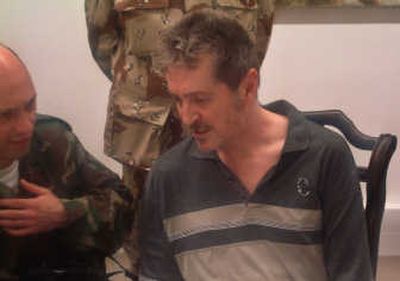Kidnapped journalist free after two-month ordeal

BAGHDAD – For more than two months, British journalist Richard Butler had sat with a hood over his head wondering what his kidnappers in Basra were planning.
Suddenly Monday, gunshots rang through the house where he was held. There were shouts. The door to his room burst open, and Butler tore off his hood to see Iraqi army soldiers.
They were as surprised to see Butler as he was to see them, according to Iraqi military officials, who described Monday’s rescue of the freelancer, on contract with CBS News, as a lucky find during a search of a house for illegal weapons.
Maj. Gen. Mohammed al-Askari, the defense ministry spokesman, said Iraqi forces stumbled upon Butler at about noon while conducting the search as part of a government offensive on illegal militias in Basra. He said “the elements” responsible for abducting Butler and his Iraqi translator Feb. 10 had been captured but gave no additional details.
Butler’s translator was freed Feb. 13 unharmed, but Butler had not been heard from since his abduction. It was not immediately clear who the kidnappers were and whether he had been held for ransom or strictly for political purposes.
His release came as the U.S. military indicated that the offensive in Basra, which began March 25, had entered a new phase in which the heaviest fighting was over. A military statement said forces were focusing on clearing areas no longer under militia control and scouring them for weapons caches.
“Our forces now control most of Basra,” said Brig. Gen. Abdul Kareem Khalaf, spokesman for Iraq’s Interior Ministry. He added that raids and arrests would continue.
Since the offensive, at least 15 police or soldiers in Basra have been killed and 400 wounded, a ministry official said Monday. The official said 400 alleged militants had been killed and hundreds wounded.
The number of civilian casualties nationwide from the fighting that erupted after the offensive has been put at more than 600, mostly in Basra and in Baghdad’s Sadr City neighborhood. Sadr City is the stronghold of Shiite cleric Muqtada al-Sadr, whose Mahdi Army militia has accused Iraqi and U.S. forces of unfairly targeting it in Basra and elsewhere.
Al-Sadr on Monday demanded that the Iraqi government reinstate more than 1,300 soldiers and police who refused to fight during the offensive. Iraqi officials said Sunday the deserters had been fired and faced court-martial. The deserters cited political, ethnic and religious reasons.
The U.S. military reported the deaths of three soldiers in attacks Monday. Two were killed when their vehicle was blasted by a roadside bomb in northeastern Baghdad, and the third died in Salahuddin province northwest of Baghdad.